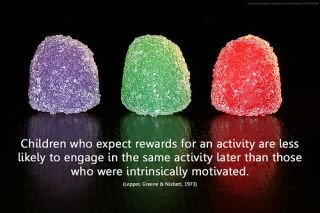Most of us do our best when we are being motivated by our goals or positive reinforcements. All of us have our own internal drives that direct the way we push ourselves into taking certain actions. The incentive theory of reaction focuses on a theme called operant conditioning.
Incentive Theory: What Inspires You to Do Well?

Operant conditioning refers to how we respond to positive and negative effects related to our actions. Most commonly, this occurs in the aspects of rewards and punishments.
Think about your personal life and your childhood. Were you spanked? If so, that is a form of the operant conditioning that takes place under the incentive theory.
For example, when a child is spanked for disregarding a rule of the home, they are facing a consequence of that action. As a result, they will think twice before breaking the same rule again. The same effect results through other forms of punishment like time-outs, loss of privileges, or writing sentences.
Similarly, you might have been motivated to do well at school by a rewards system based on your performance. You might have also earned an allowance for completing home chores regularly and on time. This is an example of positive operant conditioning under the blanket of incentive theory.
Incentive Theory: Some Incentives Seem to Take a Stronger Hold than Others
Depending on the person, some motivators will take a better hold than others. One person might not think that the reward is worth the work, while another might see it as more than worthwhile. This is usually found in young siblings with varied interests.
An example of this would be two sisters. One of them enjoys horses and being outdoors. The other would prefer to play videogames.
Telling both children that they will get to go to horse riding camp if they get good grades will likely inspire one to immediately pick up a book. The other will likely not see the effort as worth the opportunity, since the reward isn’t aligned with her personal interests. You’d get the opposite reaction if you offered a new video game as the reward to both girls.
To inspire both girls, you need to present equal and worthwhile rewards to each child. Perhaps one will get to go to horse riding camp and the other would get a new gaming console. This would create an inspiration for both kids without having to pick one’s interests over the other.
Suppose the rewards are the same items, such as pens, and you want to maximize the reward effect. In that case, you can change these items, decorate them according to what each child likes, and use their favorite characters as designs and customizations. Producing a unique pen for each child, Custom Pens allow both children to have equal rewards but play a better role.
The same is true for negative incentives or punishments. If the girls get into a fight, you might ground one indoors and take the other away from the video games.
Picking appropriate rewards and punishments is key in inspiring people to behave in certain ways.
This can also be situational.
An example of this exists with older teenagers. A teenager might usually be inspired to do their best by the positive praise that is showered on them by a parent or relative. But when their friends are around, they will not want the same kind of parental attention. They might even be inspired to act negatively because their friends will perceive them as “cooler” if they skirt parental authority.
Incentive Theory: Important Things to Consider about Incentives
Although incentives and punishments are very powerful tools in teaching responsibility and gaining the behavior we want from others, we have to remember there are factors that will affect the success of this tool. Some of the most common factors are outlined here.
Incentives Can be Used to Both Inspire Behaviors and Stop Them
If you are trying to stop a child from misbehaving, you can offer a positive reward for stopping the behavior. It doesn’t have to always be a punishment.
If time outs and other punishments aren’t working, you might try offering a positive reward, instead.
An example of this is to set a timeline. If the child manages to complete a set number of days without exhibiting their bad behavior, they can earn a reward.
A Reward Must be Obtainable for It to Be a Successful Motivator.
Often, people are discouraged by rewards that aren’t attainable.
If a child is near the end of the semester and pulling a failing grade, it is unreasonable to tell them that they must now finish the semester with an A grade or they won’t earn their reward. This will only inspire them to not even try.
Instead, try telling your child that they need to pass the semester to earn a reward, then offer a greater reward if they pull all As and Bs on the next one.
Incentives are Only Powerful if the Target of the Incentive Views Them as Important.
Don’t offer an empty threat or promise.
Telling someone that you will give them something they don’t care about having isn’t going to inspire them to do well.
Telling someone that you will punish them with something they don’t care about isn’t going to inspire them to stop negative behavior, either.
Make the reward or punishment fit the action and make it something that will mean something to the target.
Incentive Theory: Incentives Can Be Powerful Tools in All Walks of Life

There are a number of ways we work with incentives and punishments in life, sometimes without even knowing it.
Incentive Theory is present in almost all our daily actions and choices and we are continuously inspired by what happens next.
Here are some surprising examples of how incentive theory affects us.
Keeping a Job to Pay Bills
We have all had mornings where we didn’t want to go to work. We roll over and silence our alarms and think about the office drama, the pile of paperwork that is waiting for us, and all the movies we would rather stay home and binge. This is a completely normal feeling.
However, we all also get up and go to work. Why? Because we know we need the paycheck to pay our bills. If we quit our jobs, we can’t support ourselves.
That’s its own form of punishment that keeps us in line and gets us up and into the shower.
Keeping Your House Clean
Have you ever walked into someone else’s house and been taken aback by the filth? How about the way you feel when you watch an episode of one of those home disaster shows about compulsive hoarding?
If you’re like the majority of the population, they make you uncomfortable and you find yourself facing certain high levels of disgust.
This is why we keep our homes clean.
Nobody likes the process of cleaning, but we don’t like feeling dirty or being surrounded by filth either. A clean home is the reward for cleaning a home and we punish ourselves with guilty feelings when we fail to complete the necessary tasks.
Obeying the Law to Avoid Trouble
Getting a ticket is expensive. Getting thrown in jail is expensive, embarrassing, and scary. We don’t want to do these things, so we pay attention to the law and are careful about law enforcement.
We don’t want to be seen as convicts or criminals, nor do we want to face the punishment of the courts. This is why we watch our speed, maintain our taxes and registration, and follow other seemingly mundane and pointless rules that are implemented by the government.
How often have you driven down a road and thought, “There’s no reason I have to go so slow here.” Yet, you likely didn’t speed up because you were afraid of being caught doing it.
That’s Incentive Theory at work.
Paying your Bills to Avoid Financial Crisis

Nobody likes to pay bills, either. Imagine it’s payday and you look at your account.
You know you have enough money to afford a nice weekend getaway. But rent and the electric bill are both due and you’re going to need groceries and gas to get through work the next few weeks.
Chances are that you will skip the weekend getaway to take care of less fun but more responsible needs. Why? Because being out of money is punishment and the comfort of a clear mind is a positive reward for your responsibility.
Walking the Dog Before Work
This is an almost comical scenario where your own pet uses the incentive theory to train you, whether they know they’re doing it or not. What happens when you don’t take the dog out? Do you come home to torn up garbage, chewed on furniture, and messes on the floor?
Exactly. In this case, the pet has become the training master.
Positive vs. Negative Incentives
Positive Incentives
Incentives that give a positive outcome in providing an individual’s needs and desires are called positive incentives. These incentives include the law of optimism and are ready to fulfill the employee’s psychological requirements. For example, when a supervisor celebrates a new employee for doing a good job. Other positive incentives are things like recognition, job promotions, extra allowances, awards, and badges.
Negative Incentives
On the opposite end of positive incentives, negative incentives are given to improve an individual’s mistakes and errors in the attempt to produce gratifying results. Usually, negative incentives are given if the positive incentives do not work, conditioning a person to act in a way that avoids negative incentives. Some examples of this are job demotions, punishments, and penalties.
The incentive theory says an incentive attracts a person towards it. A person will most likely behave to get himself closer to that aim. This theory is grounded in conditioning, which is done by an incentive to make a person happier.
Intrinsic vs. Extrinsic Motivation
Intrinsic Motivation
Intrinsically motivated actions are carried out because of the personal satisfaction they bring. These behaviors are considered ones where the reward is simply the fulfillment of doing the activity itself. For instance, if you are in school because you like learning, you are motivated intrinsically to be in school.
Extrinsic Motivation
Extrinsically motivated behaviors, on the other end of the spectrum, are done to get something from others or avoid specific negative outcomes. The extrinsic motivator is outside of the individual. Outside rewards, such as job promotions, financial advancement, stickers, or other goodies, are good examples of extrinsic motivators. Social and emotional stimuli like praise and attention are also extrinsic motivators since they are given to the person by another person.
Extrinsic rewards are usually used to influence someone who shows limited interest in a possibly useful activity. This is like if a child shows no interest in learning to read. His or her teacher may begin to use external rewards to get him or her to engage in that activity.
Final Thoughts Incentive Theory
Incentive theory is the idea that we are all driven by rewards and punishments. We do well to make gains or to avoid unpleasant outcomes.
We all face incentive theory in the day to day actions of our lives, whether we are paying bills, going to work, or doing our dishes.
We can also use incentive theory to inspire those around us to perform well or stop behaviors that we find disturbing.



